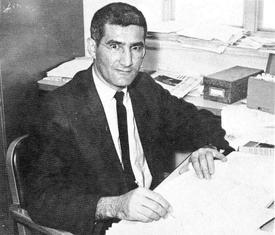Tom M. Apostol
American mathematician (1923–2016) From Wikipedia, the free encyclopedia
Tom Mike Apostol (/əˈpɑːsəl/ ə-POSS-əl;[1] August 20, 1923 – May 8, 2016)[2] was an American mathematician and professor at the California Institute of Technology specializing in analytic number theory, best known as the author of widely used mathematical textbooks.
Tom M. Apostol | |
|---|---|
 Apostol in 1965 | |
| Born | August 20, 1923 Helper, Utah, U.S. |
| Died | May 8, 2016 (aged 92) |
| Alma mater | University of Washington (B.S., M.S.) University of California, Berkeley (Ph.D.) |
| Scientific career | |
| Fields | Mathematics |
| Institutions | California Institute of Technology |
| Doctoral advisor | Derrick Henry Lehmer |
| Doctoral students | Basil Gordon Abe Sklar |
Life and career
Summarize
Perspective
Apostol was born on August 20, 1923, in Helper, Utah. His parents, Emmanouil Apostolopoulos and Efrosini Papathanasopoulos, were Greek immigrants.[3] Apostolopoulos's name was shortened to Mike Apostol when he obtained his United States citizenship, and Tom Apostol inherited this Americanized surname.[3]
Apostol received his Bachelor of Science in chemical engineering in 1944, Master's degree in mathematics from the University of Washington in 1946, and a PhD in mathematics from the University of California, Berkeley in 1948.[4] Thereafter Apostol was a faculty member at UC Berkeley, MIT, and Caltech. He was the author of several influential graduate and undergraduate level textbooks.
Apostol was the creator and project director for Project MATHEMATICS! producing videos which explore basic topics in high school mathematics. He helped popularize the visual calculus devised by Mamikon Mnatsakanian with whom he also wrote a number of papers, many of which appeared in the American Mathematical Monthly. Apostol also provided academic content for an acclaimed video lecture series on introductory physics, The Mechanical Universe.
In 2001, Apostol was elected in the Academy of Athens.[5][6] He received a Lester R. Ford Award in 2005,[7][8][9] in 2008,[10] and in 2010.[11] In 2012, he became a fellow of the American Mathematical Society.[12]
Bibliography
- Mathematical Analysis: A Modern Approach to Advanced Calculus, (1957) Addison-Wesley, ISBN 0-201-00288-4
- Introduction to Analytic Number Theory, (1976) Springer-Verlag, New York. ISBN 0-387-90163-9
- Modular Functions and Dirichlet Series in Number Theory, (1990) Springer-Verlag, New York. ISBN 0-387-90185-X
- Calculus, Volume 1, One-variable calculus, with an introduction to linear algebra, (1967) Wiley, ISBN 0-536-00005-0, ISBN 978-0-471-00005-1
- Calculus, Volume 2, Multi-variable calculus and linear algebra with applications to differential equations and probability, (1969) Wiley, ISBN 0-471-00008-6
- The Mechanical Universe: Mechanics and Heat, Advanced Edition ISBN 0-521-30432-6 (with Steven C. Frautschi, Richard P. Olenick, and David L. Goodstein)
- New Horizons in Geometry ISBN 088385354X (with Mamikon Mnatsakanian)
Notes
External links
Wikiwand - on
Seamless Wikipedia browsing. On steroids.
